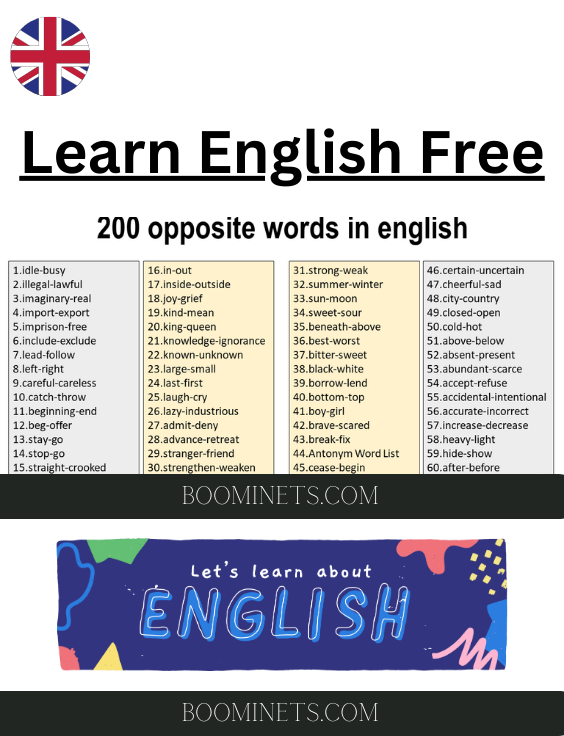
- 1.idle-busy
- 2.illegal-lawful
- 3.imaginary-real
- 4.import-export
- 5.imprison-free
- 6.include-exclude
- 7.lead-follow
- 8.left-right
- 9.careful-careless
- 10.catch-throw
- 11.beginning-end
- 12.beg-offer
- 13.stay-go
- 14.stop-go
- 15.straight-crooked
- 16.in-out
- 17.inside-outside
- 18.joy-grief
- 19.kind-mean
- 20.king-queen
- 21.knowledge-ignorance
- 22.known-unknown
- 23.large-small
- 24.last-first
- 25.laugh-cry
- 26.lazy-industrious
- 27.admit-deny
- 28.advance-retreat
- 29.stranger-friend
- 30.strengthen-weaken
- 31.strong-weak
- 32.summer-winter
- 33.sun-moon
- 34.sweet-sour
- 35.beneath-above
- 36.best-worst
- 37.bitter-sweet
- 38.black-white
- 39.borrow-lend
- 40.bottom-top
- 41.boy-girl
- 42.brave-scared
- 43.break-fix
- 44.Antonym Word List
- 45.cease-begin
- 46.certain-uncertain
- 47.cheerful-sad
- 48.city-country
- 49.closed-open
- 50.cold-hot
- 51.above-below
- 52.absent-present
- 53.abundant-scarce
- 54.accept-refuse
- 55.accidental-intentional
- 56.accurate-incorrect
- 57.increase-decrease
- 58.heavy-light
- 59.hide-show
- 60.after-before
- 61.against-for
- 62.ahead-behind
- 63.all-none
- 64.always-never
- 65.antique-modern
- 66.asleep-awake
- 67.attack-defend
- 68.aunt-uncle
- 69.authentic-imitation
- 70.awake- asleep
- 71.bad-good
- 72.bald-hairy
- 73.beautiful-ugly
- 74.brother-sister
- 75.buy-sell
- 76.drunk-sober
- 77.dry-wet
- 78.hungry-full
- 79.husband-wife
- 80.combine-separate
- 81.comedy-tragedy
- 82.reward-punishment
- 83.right-wrong
- 84.rough-smooth
- 85.south-north
- 86.spend-save
- 87.start-finish
- 88.stationary-movable
- 89.sweet-sour
- 90.swift-slow
- 91.take-give
- 92.tall-short
- 93.come-go
- 94.complete-incomplete
- 95.condemn-praise
- 96.conquer-fail
- 97.contract-expand
- 98.cool-warm
- 99.country-city
- 100.high-low
- 101.him-her
- 102.hit-miss
- 103.crooked-straight
- 104.cruel-kind
- 105.dangerous-safe
- 106.dark-light
- 107.daughter-son
- 108.day-night
- 109.dead-alive
- 110.death-life
- 111.deep-shallow
- 112.depart-arrive
- 113.destroy-create
- 114.different-same
- 115.friend-enemy
- 116.from-to
- 117.front-back
- 118.gain-loss
- 119.gather-scatter
- 120.generous-stingy
- 121.genuine-fake
- 122.fancy-plain
- 123.fat-skinny
- 124.fat-thin
- 125.fertile-barren
- 126.few-many
- 127.fiction-fact
- 128.find-lose
- 129.finish-begin
- 130.first-last
- 131.floor-ceiling
- 132.give-take
- 133.graceful-clumsy
- 134.grin-frown
- 135.guilty-innocent
- 136.happy-sad
- 137.wild-tame
- 138.win-lose
- 139.winter-summer
- 140.work-play
- 141.worthless-valuable
- 142.wrong-right
- 143.yes-no
- 144.young-old
- 145.fail-succeed
- 146.fall-spring
- 147.hard-soft
- 148.harmony-discord
- 149.harsh-mild
- 150.healthy-sick
- 151.length-width
- 152.less-more
- 153.rural-urban
- 154.sane-insane
- 155.seldom-often
- 156.selfish-unselfish
- 157.send-receive
- 158.together-apart
- 159.top-bottom
- 160.tough-tender
- 161.triumph-fail
- 162.true-false
- 163.ugly-pretty
- 164.unbreakable-fragile
- 165.under-over
- 166.unique-ordinary
- 167.up-down
- 168.useful-useless
- 169.usually-rarely
- 170.vacant-occupied
- 171.vanish-appear
- 172.victory-defeat
- 173.dirty-clean
- 174.discourage-encourage
- 175.disgrace-honor
- 176.dwarf-giant
- 177.early-late
- 178.east-west
- 179.easy-hard
- 180.empty-full
- 181.mix-sort
- 182.moist-dry
- 183.permit-forbid
- 184.polite-rude
- 185.poor-rich
- 186.positive-negative
- 187.private-public
- 188.prohibit-allow
- 189.push-pull
- 190.questing-answer
- 191.quick-slow
- 192.raise-lower
- 193.raw-cooked
- 194.morning-evening
- 195.morning-night
- 196.most-least
- 197.tame-wild
- 198.tardy-early
- 199.temporary-permanent
- 200.entrance-exit
In this exhaustive compendium, we delve into the domain of antonyms, furnishing an extensive inventory of contrary words within the English lexicon. Whether you’re a scholar seeking to augment your lexicon or a proficient endeavoring to refine your linguistic finesse, this compendium is meticulously crafted to cater to your requisites.
What are Antonyms? Antonyms, in essence, are lexical units that embody opposing significances to one another. They hold pivotal significance in language, enabling meticulous communication and conveying divergent notions. Proficiency in antonyms not only enriches your lexicon but also amplifies your capacity to articulate effectively.
Why Antonyms are Paramount Antonyms constitute a cornerstone in the acquisition of language and communication. By mastering antonyms, individuals can:
Augment Lexical Repertoire: Assimilating antonyms widens your lexical scope, empowering you to articulate notions with greater precision. Heighten Comprehension: Discerning antonyms heightens comprehension abilities by elucidating contrasting significances within a given context. Hone Writing Dexterity: Integrating antonyms in writing imparts depth and lucidity to your compositions, rendering them more captivating and nuanced. Facilitate Discourse: The utilization of antonyms streamlines lucid and succinct communication, particularly in dialogues encompassing divergent concepts or perspectives.
Standard Antonym Classifications Antonyms encompass an extensive array of classifications, each fulfilling a distinct linguistic function. Some prevalent classifications include:
- Adjective Antonyms Adjective antonyms connote antithetical attributes or traits. Illustrative instances encompass:
Exquisite: Unsightly Valiant: Timorous Munificent: Miserly
- Verb Antonyms Verb antonyms epitomize converse actions or conditions. Illustrative instances include:
Approach: Recede Construct: Demolish Generate: Obliterate
- Noun Antonyms Noun antonyms epitomize converse entities or abstractions. Illustrative instances include:
Ally: Adversary Triumph: Defeat Elation: Grief
Methodologies for Assimilating Antonyms To efficaciously assimilate and retain antonyms, contemplate the ensuing methodologies:
Contextual Assimilation: Assimilate antonyms within the context of sentences or passages to apprehend their utilization and nuances.
Cognitive Linkage: Forge cognitive links between antonyms to expedite memorization. For instance, correlate “sweltering” with “frigid” and “ascent” with “descent.”
Practical Drills: Engage in practical drills, such as pairing activities or sentence completion exercises, to fortify antonymic pairs.
Visual Scaffolds: Employ visual scaffolds, such as schematics or diagrams, to visually depict antonymic relationships and facilitate retention.
Conclusion
In summation, mastering antonyms epitomizes an invaluable aptitude that augments linguistic adeptness and communication. By acquainting yourself with contrary words in English and employing efficacious assimilation methodologies, you can amplify your lexicon, refine comprehension, and elevate your overarching linguistic prowess. Embark on your odyssey towards antonymic mastery today!